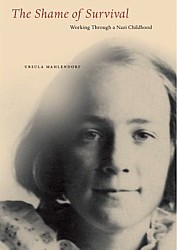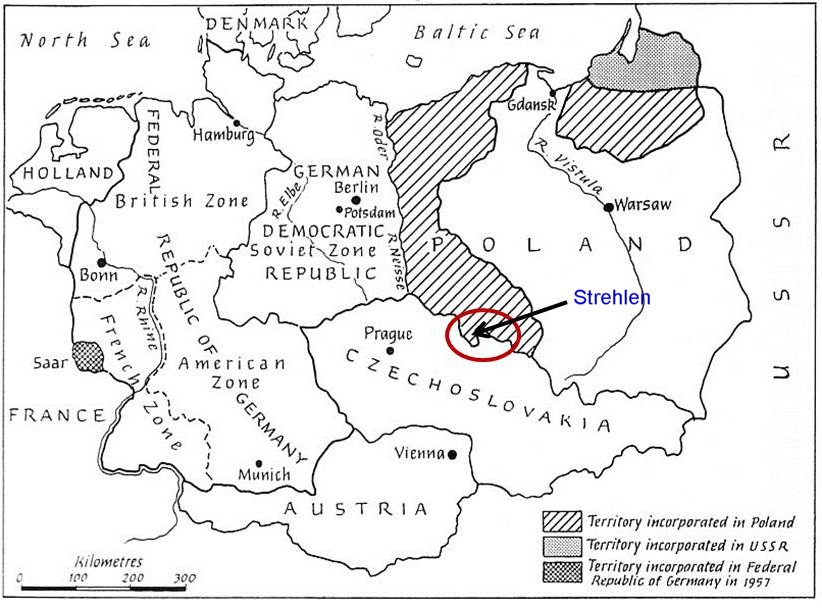Prof. Mahlendorf's memoir, Introduction
(2 pages)
Introduction: Today in California
Writing now, in Santa Barbara, California,  I can hardly
believe that the events and experiences of 1933 to 1950--my formative years
and tragic, criminal years for my native country, Germany--took place over sixty
years ago, so vividly do they rise up in my mind. At sixteen, I was already
aware that my familyís history and my experiences needed recording. But it took
the long years since then to muster the courage to write them down. Not that
I feared running into feelings or remembering traumatic experiences that might
surprise me. I had been in psychoanalytically-oriented psychotherapy for years
and did not think that my mind held surprises for me! Rather, I was afraid to
understand who I would have become had the Nazi regime lasted.
I can hardly
believe that the events and experiences of 1933 to 1950--my formative years
and tragic, criminal years for my native country, Germany--took place over sixty
years ago, so vividly do they rise up in my mind. At sixteen, I was already
aware that my familyís history and my experiences needed recording. But it took
the long years since then to muster the courage to write them down. Not that
I feared running into feelings or remembering traumatic experiences that might
surprise me. I had been in psychoanalytically-oriented psychotherapy for years
and did not think that my mind held surprises for me! Rather, I was afraid to
understand who I would have become had the Nazi regime lasted.
I always knew that I participated in Hitler Youth with
greater enthusiasm than my girl friends and my classmates in grade school. I
now understand the reasons for it: Before he died in 1935, my father had become
a member of the SS. After Fatherís death, Hitler gradually became an idealized
substitute father for me. I championed his cause all the more, as my mother
showed her disapproval of my real father and of Hitlerís party. In writing this
account, I discovered, to my relief and surprise, that by the time I was thirteen
or fourteen I had begun a rebellion against the conformity Hitler Youth (HY)
demanded of us even though I was unaware of what I was doing or feeling
I took part in Jungmädchen from age ten to fourteen
like all children in Germany , attended a year-long leadership training and
went to a Nazi Teacher Seminary for a few months after graduation from grammar
school. As a member of the cohort of Germans who spent their entire childhood
under the Nazis and who became politically aware of the damage done by Nazism,
I felt that I had a special obligation to speak to my students about what we
participated in and what happened to us. I had to tell them about the enthusiasms
and the beliefs I held then; the disillusionment, anger, grief, and remorse
I experienced after German defeat; and the grief, guilt and shame that haunt
me still. During my forty years of university teaching, I taught my students
about the Nazi years and their impact on us. I read and analyzed with them literary
works on how German writers account for the Nazi past, as we called these studies
during the 1960s and 70s, and the Holocaust in German literature as we called
them since the 1980s when Holocaust Studies came in vogue. I researched German
literary texts for the relationship between individual conscious and unconscious
psychology and political ideology and power, traced vestiges of everyday fascism
in the contemporary world, and investigated the historical roots of Nazism in
educational institutions and abusive child raising practices. I wrote on the
psychology of Nazi women informers and about how German writers dealt with and
continue to deal with their Nazi past. From the late 1970s on, Feminism provided
me with a language to understand issues of class and gender and made me conscious
of the gender and class imprints on my body and my early life. Feminism also
confirmed what I knew intimately from personal experience: the personal is the
political. When I came to write the present account I did not need to consult
histories of the pre-war or post-War II periods. Both my teaching and my research
gave me the factual frame into which I could easily place my own experience,
all the more so since from about age eight or nine, I was personally and keenly
aware of such political events as Crystal Night or the German army marching
into Austria.
I began to think seriously about writing this account after
the death by breast cancer of a student of mine who fully understood and promised
to carry on my work on the socio-politics of traumatic experience and its depth
psychology. After her death, my research on the political and cultural consequences
of child abuse in German speaking countries bogged down. As a diversion from
this complex and arduous undertaking, I wrote a few episodes of my early life
and it seemed as if I had opened a floodgate. After that, it was easy to let
the memories come and to record them. The mourning for one friend led me express
my grief for childhood family and friends.
A word about my writing: Having been a refugee, having been
expelled from my hometown at sixteen without any possessions, having immigrated
as a university student to the US with only a suitcase, I have no records of
my early life, no pictures and no diaries or letters, until my late twenties.
As memories of my early childhood came crowding in --first events, and then
ever more details, particularly details about the places of my childhood-- I
found I could reconstruct the floor plan of the house I lived in to age four,
down to the staircases and hallways that I dreaded. I could visualize the streets
of the town where I walked on my way to nursery school. I could draw maps of
sections of the town we lived in till I was sixteen, including the houses, churches
and public buildings before and after their destruction during the last days
of WWII. My mind held an entire geography of childhood and, to my surprise,
my grieving turned into its celebration.
I will add my sketches and outlines of that geography instead
of the few pictures that others, like my brothers, have of the persons and places
I grew up with. Since I have no pictures of myself except for two identity card
pictures at age twelve and sixteen nor of those in my family who were meaningful
to me, I will include photographs of sculptures, some drawings and maps through
which I later attempted to understand myself and my childhood world. I did not
want to quote historical records of the time or attempt to reconstruct what
I lived with the help of maps, books, records of others. With a few exceptions,
I will not report what others told me about myself as a child but rather what
I remember about it. Therefore, my account will be strictly from my perspective,
my experience as I construct it from my memory.
The end of World War II, the Nuremberg Trials, and early
encounters with several political concentration camp survivors provided me with
enough intellectual insight into the crimes of Nazism and German militarism
to reject both by the end of 1946. An intellectual rejection is easy, as I was
to learn. During my entire life, and sometimes at the most trivial occasions,
I discovered attitudes, unconscious biases, and emotional reactions that dated
back to my Hitler Youth years. These attitudes had led a subterranean life despite
my rejection of a racist ideology and my belief in democratic forms of governance,
despite my commitment to internationalism and the UN, my social activism on
behalf progressive causes and my research and teaching of literature on the
Holocaust, on Feminism, and on the efforts of German post WWII writers to account
for Nazism.
From my first full encounter with the extent of Nazi crimes
revealed during the Nuremberg trials, I had some understanding that I had been
given the kind of indoctrination and training that could have enabled me to
participate in the persecution of the enemies of Nazism. I certainly possessed
the youthful enthusiasm and sustained some of the psychological traumatization
that can be exploited by unscrupulous leaders. And I was angry, frightened and
confused enough to have welcomed emotional release through violence. I was too
young during the Nazi period to have participated in their crimes. But by the
end of the war, in April 1945, I did come fearfully close to being involved
in one of these crimes as a by-stander.
As painful and traumatic as the loss of the war was for
me, both disillusionment and remorse led me to question myself and to reflect
on my actions and convictions. My early experience also inspired my desire to
communicate what I learned about Nazism, the Holocaust, and war and violence.
That is why as an adult I saw it as one of my tasks in teaching and public lectures
to speak about my experience so as to make my students and young people understand
how seductive any ideology, nationalism and militarism can be Ėnot just Nazism--
and where they can lead you. I pursue the account of my experience and my quest
for an education through the 1950s, when I found at the university an intellectual
haven that made my further development possible. I end it with my immigration
and my finding a new home in the United States. As I tell of the events and
persons of my early life, I will comment on how I came to see and understand
them later in my life. I believe that my experience has particular relevance
for the world of 2005 as now, again, countries everywhere embark on ideological,
military and ethnic cleansing adventures like the ones that led my country of
origin along such a destructive course.
this page may not be reproduced in any form
back to top; to UCSB Hist 133c homepage;
Hist 133q homepage
 I can hardly
believe that the events and experiences of 1933 to 1950--my formative years
and tragic, criminal years for my native country, Germany--took place over sixty
years ago, so vividly do they rise up in my mind. At sixteen, I was already
aware that my familyís history and my experiences needed recording. But it took
the long years since then to muster the courage to write them down. Not that
I feared running into feelings or remembering traumatic experiences that might
surprise me. I had been in psychoanalytically-oriented psychotherapy for years
and did not think that my mind held surprises for me! Rather, I was afraid to
understand who I would have become had the Nazi regime lasted.
I can hardly
believe that the events and experiences of 1933 to 1950--my formative years
and tragic, criminal years for my native country, Germany--took place over sixty
years ago, so vividly do they rise up in my mind. At sixteen, I was already
aware that my familyís history and my experiences needed recording. But it took
the long years since then to muster the courage to write them down. Not that
I feared running into feelings or remembering traumatic experiences that might
surprise me. I had been in psychoanalytically-oriented psychotherapy for years
and did not think that my mind held surprises for me! Rather, I was afraid to
understand who I would have become had the Nazi regime lasted.